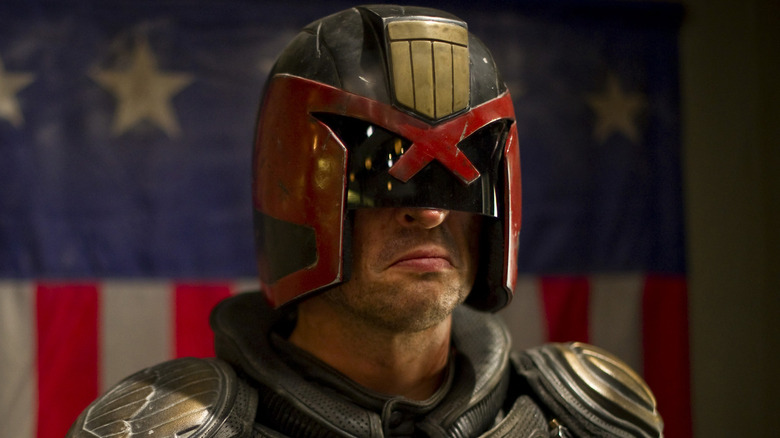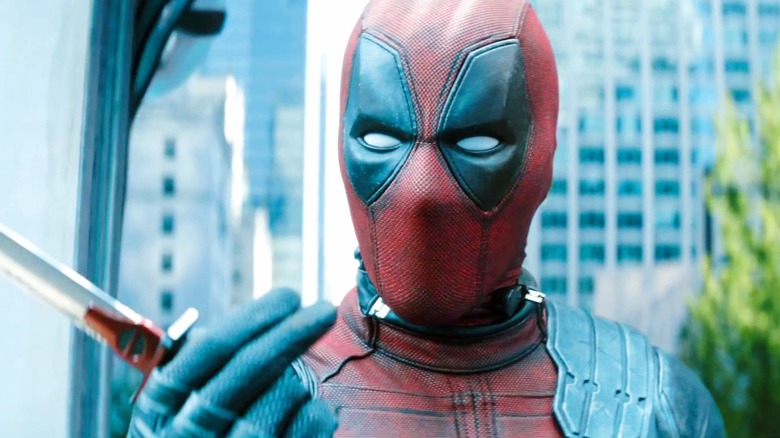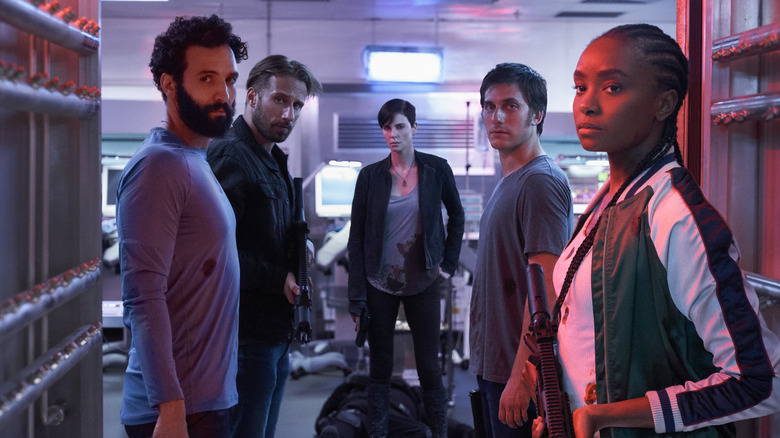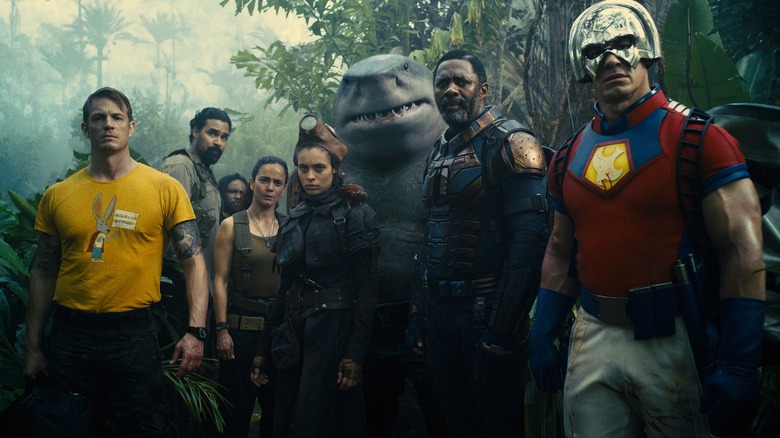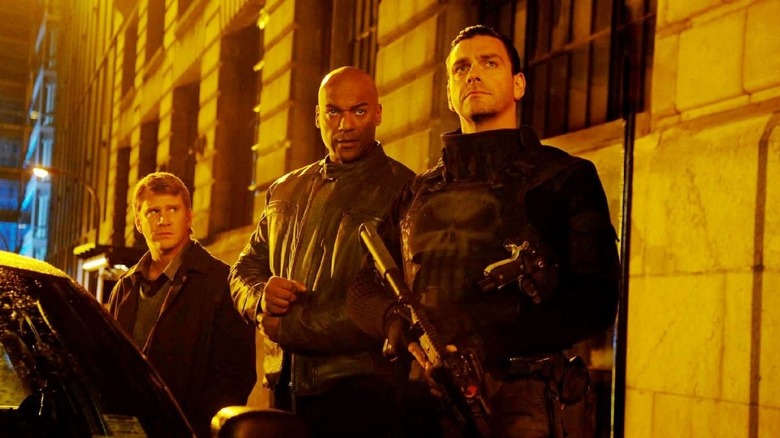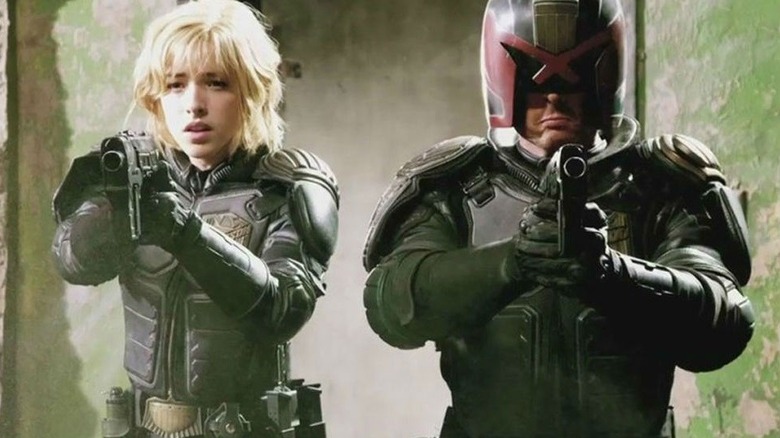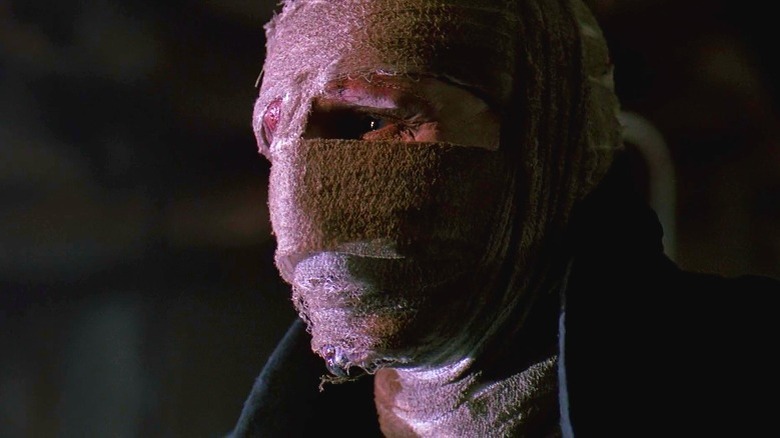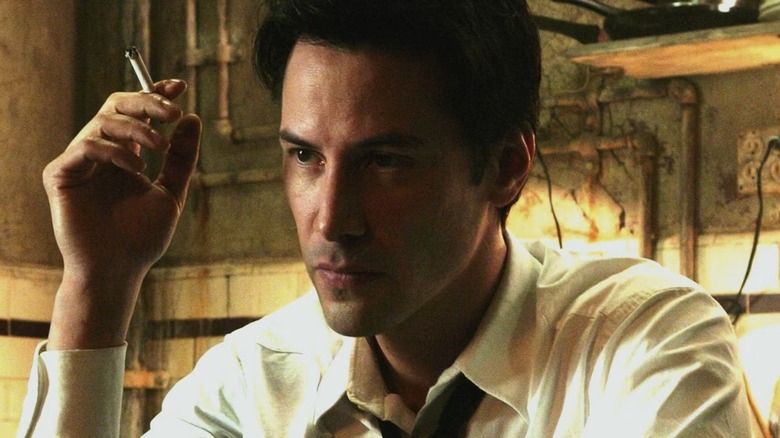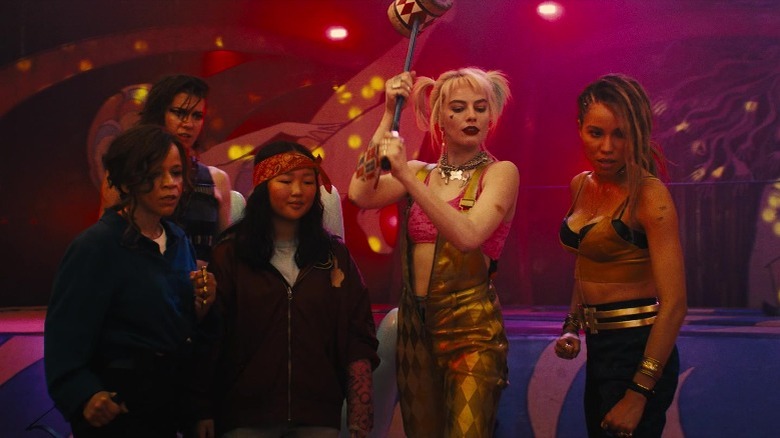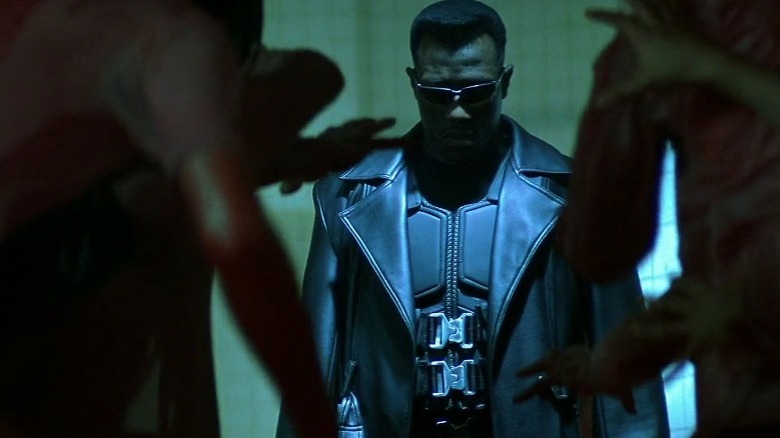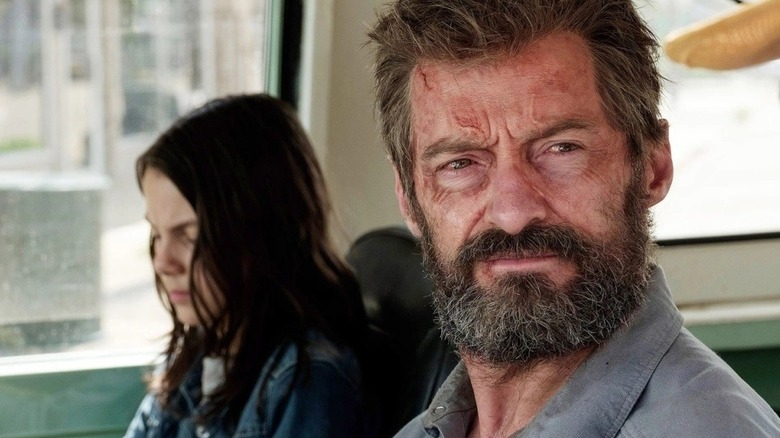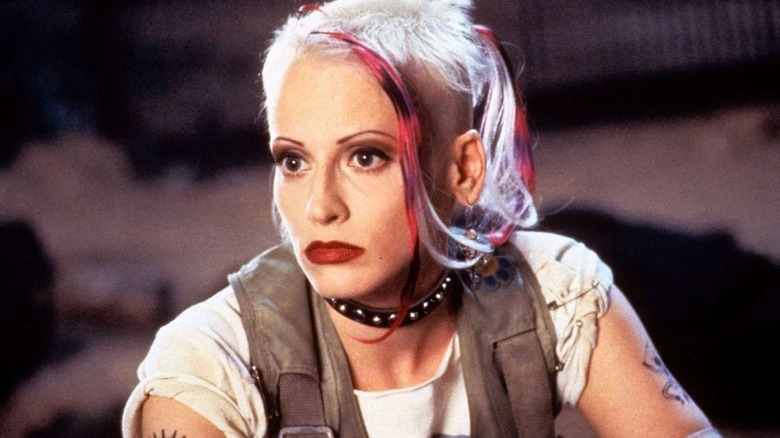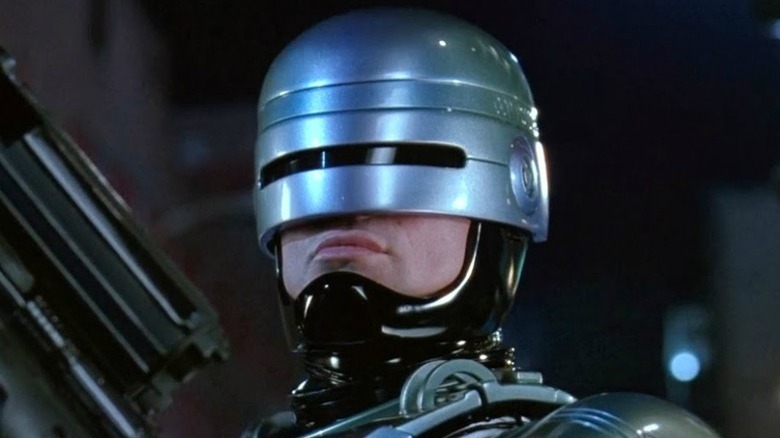The 12 Best R-Rated Superhero Movies, Ranked
For a genre that uses heroic violence as its bread-and-butter, it's kind of funny how many superhero movies insist on being PG-13 or lower. On some level, the calculation makes sense: It's an expensive genre, and the money must be recouped. However, when done right, R-rated superhero flicks can be very profitable, and they often score better with critics. If the genre is founded on violence, there's something to be said for movies that allow the violence to reach a logical consequence, whether to enhance catharsis, traffic in more serious emotional territory, or to simply maximize enjoyment.
This list compiles and ranks the top dozen R-rated superhero movies based on their cultural impact and lasting legacy as opposed to their Rotten Tomatoes scores. We're disregarding the mixed reception that a lot of them originally got, often upon opening to baffled audiences and critics who didn't expect their comic book blockbusters to be so out-there and unhinged. From filthy comedy and harrowing drama to deranged action flicks, here are the best dozen R-rated superhero movies of all time. We've ranked them from worst to best, though, quite frankly, they're all fantastic examples of what superhero movies can be when filmmakers are let off the leash.
12. Deadpool 2
The first "Deadpool" was a watershed moment in superhero movie history: A vulgar, freewheeling, meta comedy movie that proved the genre could do away with its time-tested tonal earnestness and still make bank. In many ways, it was more an event than a movie; the point of it, in the manner of what "Shrek" did to American animation 15 years prior, was to revel in the anarchy and the rule-breaking, to laugh at the audacity of the jokes more so than at the jokes themselves. And (again, much like "Shrek") the "Deadpool" series got better in its second installment, when, stripped of the novelty and the shock value, the filmmakers had to hone in on simply making a strong movie in its own right.
The first and second "Deadpool" films have similar critical scores on sites like Rotten Tomatoes and Metacritic, but when you get into the reviews and actually read them, it's clear that "Deadpool 2" was more impressive. Vox called the sequel a "superhero movie so tightly made and brilliantly entertaining that even Deadpool himself would have trouble finding fault with it," while Den of Geek said that the follow-up is "bigger, funnier, and better" than the original.
11. The Old Guard
Netflix original action movies have not historically been synonymous with critical prestige. But, in 2020, the brilliant Gina Prince-Bythewood (who had previously proven herself a master of the romantic drama with "Love & Basketball") bucked the trend by crafting a Netflix original superhero flick with a stunning focus on emotion and character — as well as plenty of finely-choreographed, hard-R fights that any action movie fan will love.
Adapted by Greg Rucka from the graphic novels by himself and Leandro Fernández, "The Old Guard" tells the story of a group of people who, gifted-slash-cursed with regenerative abilities that render them essentially immortal, have spent centuries fighting together for various causes across human history and now work as mercenaries-for-good, taking missions that allow them to help people in need. The group's leader, Andromache of Scythia, aka Andy (Charlize Theron), has become jaded and disillusioned from her centuries of exposure to the worst of humanity. She has to pick herself up in order to guide U.S. Marine Nile Freeman (KiKi Layne) when she manifests powers and becomes the band's newest member.
Critics widely considered the film to be an example of the superhero genre at its most profound and emotionally arresting, with Vulture saying, "Watching it, I don't miss those other movies with their shared universes and painstakingly built, vigilantly managed worlds. I watch 'The Old Guard' and try to imagine a new world, one where other comic-book movies are this well made and breathtaking."
10. The Suicide Squad
There was, at least, a kernel of a good idea in David Ayer's "Suicide Squad." An anarchic super-anti-hero movie carried along by rollicking pop music with little thought to decency or propriety could have been an incredibly fun experience. It wasn't, of course. But there was enough to the concept to sustain a second go, and, sure enough, with James Gunn at the helm, "The Suicide Squad" turned out to be everything we so wanted its predecessor to be (and that's just as well, as David Ayer has given up on his quest to release his original "Suicide Squad" cut).
Keeping only Joel Kinnaman as Rick Flag, Jai Courtney as Captain Boomerang, Viola Davis as Amanda Waller, and (of course) main attraction Margot Robbie as Harley Quinn, "The Suicide Squad" is something of a soft reboot, mostly ignoring the previous installment in favor of an actual story, complete with surprisingly subversive anti-imperialist subtext. Critics were impressed not only by Gunn's customary pleasure-maxing competence, but by his ability to make the most of the R rating. "It was time for someone to come along and pop the balloon," said the AV Club. "Pulpy and outrageous, irreverent and ultraviolent, 'The Suicide Squad' does so with a smile."
9. Punisher: War Zone
In 2008, Lexi Alexander's "Punisher: War Zone" presented a peerless vision of the comic book vigilante film as a bloody, amoral, self-imploding castle of horrors. The heaviness of its violence and the sheer relentless bombast of its tone make even the edgiest of other Marvel-based films — to say nothing of the character's later Netflix series adaptation — look like child's play.
Alexander sees right past any pretense of moral authority in Frank Castle (Ray Stevenson), fashioning him as, essentially, a serial killer whose targets happen to be criminals. And, to the same degree that it refuses to color vigilantism with any kind of moral coziness, the film also gives viewers all the gleeful aggression they could possibly want, in unhinged forms ranging from exploding punches to mid-air missile blasts.
The result is as disturbing to watch as it is transfixing. Although reviled by reviewers upon release, "Punisher: War Zone" has since become a cult favorite and has grown in critical stature, with Giant Freakin Robot writing in 2024: "Reality is something 'Punisher: War Zone' is rejecting at nearly every turn. Its tongue is jutting through its cheek and that's what makes it such a hoot, but audiences weren't really vibing with that [in 2008]."
8. Dredd
Pete Travis and Alex Garland's "Dredd" slipped by largely unnoticed in the 2012 post-summer/pre-Oscar season cinematic lull; its box office failure is one of the reasons we never got to see a "Dredd" sequel. It was an unfair fate for one of the most distinctive and memorable superhero films of the 2010s, one that looked to the John Wagner and Carlos Ezquerra-created "Judge Dredd" comic strips not just as a text to transpose, but as an inspiration to draw from in its garish exuberance and satirical sharpness. It's a movie that set out to turn a mirror to superhero cinema much like the source material did to superhero comics, and you could scarcely have asked for an adaptation that honored that mission more thoroughly.
Set in a dystopian version of the United States, where law enforcement officers known as "judges" exert absolute power over the crime infested Mega-City One, "Dredd" follows the team-up between Judge Dredd (Karl Urban) and psychic new recruit Cassandra Anderson (Olivia Thirlby). They set out to take down drug lord Madeline "Ma-Ma" Madrigal (Lena Headey), who's gotten rich off a new time-slowing drug called "slo-mo." All members of the central trio turn in attention-commanding, larger-than-life performances, and the film is a decadent marvel on every front — but what really impresses is the boldness of it all. As NPR said, "Not only is 'Dredd' a smart bit of September counterprogramming, it's a gleefully audacious, visceral, near-perfect action movie."
7. Darkman
Long before Sam Raimi laid out the blueprint of modern comic book cinema with his "Spider-Man" movies, he showed us what a grittier take on cinematic superheroes looked like with "Darkman." In the process, he laid the groundwork for adult-oriented superhero films such as Christopher Nolan's "Dark Knight" trilogy. What makes "Darkman" even more special on top of that historical importance is the fact that its main character is original, created by Raimi himself.
Although Raimi's aesthetic sensibility evokes the pulpiness and plasticity of comics like "The Shadow," the inspiration for Dr. Peyton Westlake, aka Darkman (Liam Neeson), goes further back: From his grotesquely disfigured appearance to his vacillation between nobility and viciousness, he's all Universal monster. This being Raimi, of course, the visual nods don't stop there, extending to everything from German expressionism to René Magritte paintings.
But, more than an aesthetically rich superhero film, this is an unusually gut-wrenching one, with Neeson and Frances McDormand — who plays Westlake's girlfriend Julie Hastings — masterfully capturing the war for the soul of a broken man. Critical reception was positive in 1990 and the film has only become more esteemed since. In 2024, The Movie Isle said: "'Darkman' proves that Raimi even early in his career had complete control of the film medium no matter the budget or style of the film."
6. Constantine
It just may be the case that the critical mainstream wasn't ready for Francis Lawrence's "Constantine" in 2005. While contemporary movie fans may hear "Keanu Reeves-starring action-horror flick with intricate Christian-inspired mythology and Tilda Swinton as the angel Gabriel" and think it sounds like the best thing ever, the mid-2000s were a time when that kind of creative gutsiness wasn't always rewarded by the prevailing cultural sensibility. And, sure enough, critics largely trashed "Constantine" upon its original release. Audiences were only marginally kinder to it, taking it to a decent but underwhelming $230 million worldwide gross against a $100 million budget.
However, there's a reason "Constantine" became a cult classic and has a sequel still reportedly in the pipeline despite DC slate changes: If you're willing to take it on its eccentric terms, it's just a plain awesome film. Critics may have overlooked its campy and operatic pleasures at the time, but they stand out tremendously in the current blockbuster landscape. Rotten Tomatoes itself ran an editorial in 2020 "apologizing" for the film's Rotten score, with Rafael Motamayor writing that "especially at a time when [comic book-inspired] films tend to follow a standard formula, we look toward style and unique visions more than ever. In that regard, you'd be hard-pressed to find a more intriguing take on the comic book horror story than the tale of the freelance exorcist, John Constantine."
5. Birds of Prey
Lots of films were impacted by the COVID-19 pandemic, but Cathy Yan's "Birds of Prey" was really done dirty. It's a slice of cinematic pop perfection so riotously crowd-pleasing and rewatchable that it could well have become a historical word-of-mouth hit for DC Films, if only the universe had allowed it to have box office legs beyond its underwhelming, poorly-marketed opening. The consolation, of course, is that we still do have "Birds of Prey" itself, the most purely fun superhero film to have been made in years, if not decades. It's hard to think of another film since "The Incredibles" that can rival it for wit, storytelling acumen, and aesthetic effervescence.
Boasting superstar performances not only from Margot Robbie, but from the entire female ensemble of Mary Elizabeth Winstead, Jurnee Smollett, Rosie Perez, and Ella Jay Basco (to say nothing of Ewan McGregor's bravura villain work), it's a punk-clad sugar rush of a film that perfectly matches its loopy antiheroine in charisma and energy. It boasts action sequences of Olympic-level acrobatic flair and enough directorial style for a whole filmography — despite being Yan's first commercially-released film. Crooked Marquee perhaps put it best, writing, "'Birds of Prey' is, ultimately, deliciously empowering. It never loses what it wants to say about the everyday struggle of being a woman in a world that benefits from female victimhood, and its unapologetic vulgarity and boldness are thrillingly unforgettable."
4. Blade
We're probably not alone when we say that we are starting to worry about Marvel Studios' "Blade." It is currently unclear if the Mahershala Ali-starring Marvel Cinematic Universe project will ever actually see the light of day, but we'll always have the original — and, anyway, it's hard to imagine a new film offering a better take on the character. Stephen Norrington's "Blade" didn't just introduce mainstream movie audiences to Marvel Comics and spawn a highly successful trilogy, it fundamentally reconfigured what Hollywood superhero movies could be.
Never before had we seen a movie supe quite like Wesley Snipes' Blade: Relentlessly cool, statuesquely regal, dressed with the gusto of a runway model, stoic and one-liner-prone like a film noir detective yet gallant and dependable and morally righteous like a matinee hero. Anticipating "The Matrix" and the 2000s glut of horror-tinged dark fantasy blockbusters alike, "Blade" brings its humankind-versus-vampires plot to life the way a great '90s music video director would visualize a thumping trip hop track, conjuring jaw-dropping cyber-Gothic images from thin air and then infusing them with an emotional gravity that feels not altogether explicable.
Unsurprisingly, it's another case where critical hindsight only brought out the flavor. On the occasion of the movie's 25th anniversary, the Observer said: "When you look into those mirrored sunglasses, it's hard not to think that superhero movies were maybe better before superhero movies figured out exactly what they were going to be, and filed down the fangs."
3. Logan
Many superhero films in the 2010s tried for straight-faced drama and performative grittiness, but, more often than not, there was just no "there" there. The era of the supe flick boom was also the era of the supe flick streamlining — of its transformation into a safe enterprise, intended first and foremost to amuse as many and alienate as few viewers as possible — and even the most strained attempts at seriousness are hard to carry out convincingly under such populist constraints. Enter "Logan."
The sequel to 2013's "The Wolverine," it took that film's concept of Wolverine (Hugh Jackman) as a tortured wandering rōnin and ran even further with it, basically obliterating all "X-Men" movie continuity in favor of a mostly standalone tale that begins with Logan and a dementia-suffering Charles Xavier (Patrick Stewart) living off the grid in a dystopian future. Logan, now maybe the last surviving X-Man, is forced back into action and carnage to help protect a young mutant girl (Dafne Keen) — and he hates every minute of it.
What results from that grim, Western-esque setup is the most emotionally affecting superhero movie ever, which unsurprisingly became the first to get an Oscar nomination for writing. The R rating is instrumental: As AV Club said, "Logan" is "a comic-book adaptation that takes its characters and its themes seriously, that elevates the genre past spectacle and on to something resembling art, even poetry. It's adult in more ways than one."
2. Tank Girl
If the integrity of commercially successful punk music continues to be debated among melophiles, the movie world has its own share of punk and punk-inspired efforts to gauge for industrial defiance or lack thereof. By any estimation that holds anti-commercialism to be the mark of true punk, Rachel Talalay's "Tank Girl" can be called great punk art: It was too radical, too brash, too loud, too queer for its time, and maybe still is even for ours.
An anti-system, anti-establishment tale from back when such films could get away with being the real deal in Hollywood, "Tank Girl" follows Tank Girl (Lori Petty) and Jet Girl (Naomi Watts), who team up to take on the Water & Power corporation that controls most of their dystopian world. Rejected by audiences and critics alike in 1995, the movie has since become the defining example of a cult classic in the superhero genre, inspiring everything from "Birds of Prey" and "Kick-Ass" to "Mad Max: Fury Road."
"It felt like it was made for women to see themselves in, rather than have to project themselves into from a distance," Megan Carpentier said when revisiting the film two and a half decades after its release for NBC News. "It taught some of us exactly why representation mattered; 25 years later, it shows why it still does."
1. RoboCop
Paul Verhoeven specializes in satirical films that cut so close to the bone they aren't even widely perceived as satire. Even more than "Starship Troopers" or "Showgirls," though, there's a particular urgency to the political subversion of "RoboCop" and a particular strength to its brand of sly audience condemnation, because it's knowingly Verhoeven's most mainstream film — and none the tamer for that.
Even in 2024, a lot of viewers still don't quite get that RoboCop's (Peter Weller) cyber-augmented antics are intended as a nightmare vision of Reagan-era neoliberalism, with super-strong privatized law enforcement as the ultimate expression of corporatism and militarism taking over all facets of public life; this is the sci-fi film most representative of the 1980s. In five decades of modern superhero films, no other work has cut so ruthlessly to the core of the genre's fundamental conservatism, nor analyzed the relationship between crimefighting and capitalist status quo management so sharply.
It's no wonder that the film became such a towering classic. "[Verhoeven] made Detroit's decay tactile, visceral and immeasurably loud, limning it in ideas about the limits of human identity and the hilarity of consumer culture," Paste magazine said after naming "RoboCop" the 12th-best sci-fi film ever made. "He wasn't pointing to the hellscape of future Detroit as the battlefield over which the working class will fight against the greedy 1%, but instead to the robot cop, to Murphy, as the battlefield unto himself."
